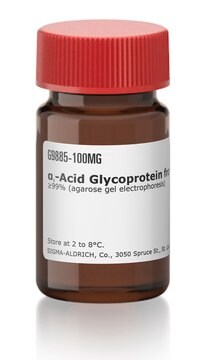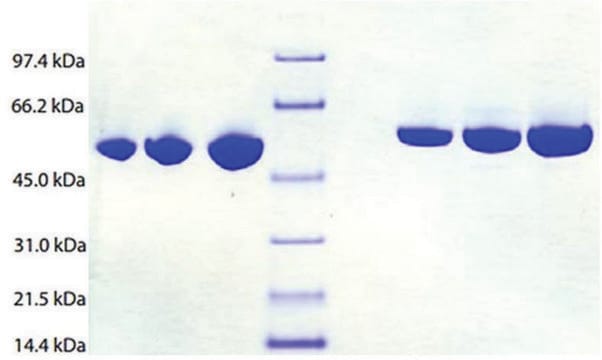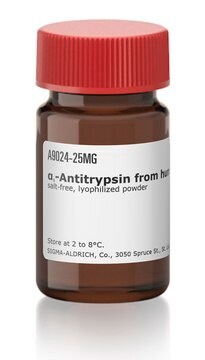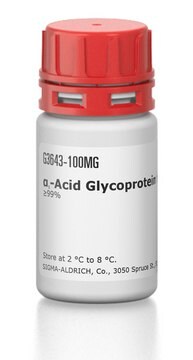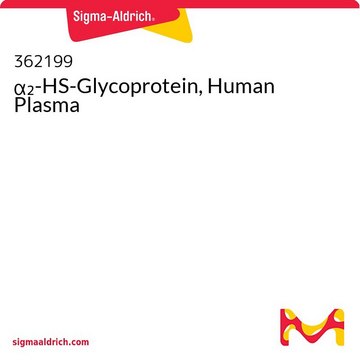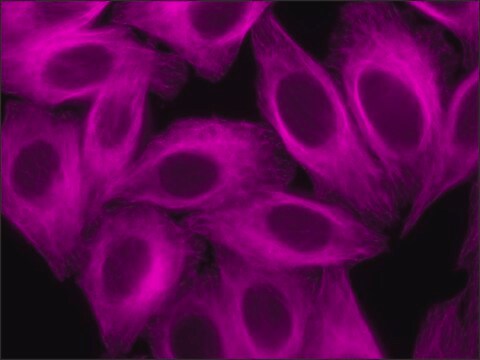G0516
α2-hs-Glycoprotein from human plasma
≥90% (SDS-PAGE), lyophilized powder
Sinonimo/i:
Plasma glycoprotein
Autenticatiper visualizzare i prezzi riservati alla tua organizzazione & contrattuali
About This Item
Prodotti consigliati
Categorie correlate
Descrizione generale
α2-HS glycoprotein (A2HS) is a glycoprotein (molecular weight 49,000) present in human plasma at levels ranging between 40 and 85 mg/dl. A2HS is a major protein component of the bone matrix and could be involved both in mineralization and bone resorption.
Applicazioni
Fetuin (α2-HS-glycoprotein) was used to confirm its role in enhancing the suppression of tumor necrosis factor (TNF) release from activated macrophages by CNI-1493. It was also used in 2-dimensional electrophoresis to detect glycosylation and influence spot pattern.
Confezionamento
Package size based on protein content
Stato fisico
Lyophilized from 20 mM Tris-HCl, pH 8.0, with 200 mM NaCl
Esclusione di responsabilità
RESEARCH USE ONLY. This product is regulated in France when intended to be used for scientific purposes, including for import and export activities (Article L 1211-1 paragraph 2 of the Public Health Code). The purchaser (i.e. enduser) is required to obtain an import authorization from the France Ministry of Research referred in the Article L1245-5-1 II. of Public Health Code. By ordering this product, you are confirming that you have obtained the proper import authorization.
Codice della classe di stoccaggio
11 - Combustible Solids
Classe di pericolosità dell'acqua (WGK)
WGK 3
Punto d’infiammabilità (°F)
Not applicable
Punto d’infiammabilità (°C)
Not applicable
Certificati d'analisi (COA)
Cerca il Certificati d'analisi (COA) digitando il numero di lotto/batch corrispondente. I numeri di lotto o di batch sono stampati sull'etichetta dei prodotti dopo la parola ‘Lotto’ o ‘Batch’.
Possiedi già questo prodotto?
I documenti relativi ai prodotti acquistati recentemente sono disponibili nell’Archivio dei documenti.
Klemens Löster et al.
Methods in molecular biology (Clifton, N.J.), 446, 199-214 (2008-04-01)
The detailed characterization of complex protein mixtures as in samples from biological sources cannot be sufficiently performed by separation of polypeptides according to their molecular weight as is done by conventional sodium dodecyl sulfate-polyacrylamide gel electrophoresis (SDS-PAGE) (1DE). For analysis
B Boutin et al.
American journal of human genetics, 37(6), 1098-1105 (1985-11-01)
The genetic polymorphism of human alpha 2-HS glycoprotein was studied by ultrathin-layer isoelectric focusing in a pH range 4.2-4.9 followed by immunoblotting using antisera specific for the protein. Three common phenotypes, HSGA1-1, HSGA2-2, and HSGA1-2, were easily recognized using this
J P Lebreton et al.
The Journal of clinical investigation, 64(4), 1118-1129 (1979-10-01)
A nonspecific opsonin function has been ascribed to human alpha 2 HS glycoprotein. Its serum level has been shown to be decreased in trauma patients. Recent studies from this laboratory revealed a heterogeneity among the products obtained in the course
H Wang et al.
Proceedings of the National Academy of Sciences of the United States of America, 95(24), 14429-14434 (1998-11-25)
Macrophages become activated by bacterial endotoxin (lipopolysaccharide) and other stimuli to release proinflammatory cytokines and NO. To prevent release of toxic or potentially lethal quantities of these factors, the state of macrophage activation is counter-regulated by anti-inflammatory mediators (e.g., glucocorticoid
Hanane Moustaoui et al.
Nanoscale, 11(8), 3665-3673 (2019-02-12)
The study of protein interactions with gold nanoparticles (GNP) is a key step prior to any biomedical application. These interactions depend on many GNP parameters such as size, surface charge, chemistry, and shape. In this work, we propose to use
Il team dei nostri ricercatori vanta grande esperienza in tutte le aree della ricerca quali Life Science, scienza dei materiali, sintesi chimica, cromatografia, discipline analitiche, ecc..
Contatta l'Assistenza Tecnica.